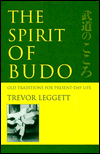The Spirit of Budo is a somewhat unusual book in that it is a collections of essays about the martial arts and other aspects of traditional Japanese culture written by a foreigner, published in the most prestigious of the Japanese martial arts periodicals, Budo, the monthly publication of the Nippon Budokan. Imagine–an Englishman telling the Japanese about budo. It’s like a Japanese discussing baseball with Americans or cricket with the British. Those sports are ours–what could this guy possibly know? Trevor P. Leggett, though, is a most unusual and qualified person in this area of Japanese culture. He is one of the most senior non-Japanese judoists in the world, having begun his study of the art in 1930. Prior to World War II, he spent several years living and training in Japan while stationed at the British embassy. After military service he joined the BBC, rising to become the head of its Japanese Service. Since retiring, Leggett has written extensively on the martial arts, as well as Zen and shogi (Japanese chess), both of which are areas in which he is eminently qualified. These essays are the distillation of more than six decades of intense study, with a number of the best teachers in the world, by a thoughtful and insightful man.
The essays are divided into four broad themes. The first section, “Bujin and the Gentleman,” includes the essays “The Spirit of Budo,” “Sincerity,” “Spectators,” “Yin and Yang in Budo,” and “Inner Calm.” “Old Traditions Breathe Fire Into Present-day Life” covers such topics as chivalry, world culture, generosity, humor, and technical training. In the third section of the book, “Budo: Learning for Life” Leggett discusses the idea of musha shugyo in “Travel and Learn,” different methods of learning in “The Four Keys to Learning,” how one or two succinct comments made at the right moment can change a person’s life in “Dynamic Words,” and some of the intangible aspect of martial arts training in “Free from Fixed Ideas.” The final portion of the book is “Dr. Jigoro Kano and Judo.” Here, the author discusses at length some of budo’s most important precepts. The first essay, “The Buddhist Ideal of Mutual Benefit,” examines one of judo’s most basic maxims, jita kyoei, and should prove very useful for everybody in budo. “Bunbu Ryodo,” the second piece in this chapter, is a succinct examination of the interdependence of literary study and martial discipline. “Judo in Real Life” can be extended to any and all of the martial arts or other disciplines referred to in Japanese as seishin shugyo (austere training). The last essay, “The Will to Make it Happen,” returns to an earlier topic and examines some of the mental and spiritual sides of martial arts study.
There are several instances in this volume, where the written English seems a bit cumbersome. I am not sure whether this is because Leggett wrote in Japanese and the translator used less felicitous phrasing, or if the essays were intended for non-native readers of English. I suspect that the former is true, having read a number of the author’s other books. In any case, there are parts of these essays that resonate and bear reading and consideration over an extended period. I found myself thinking, “Oh! So that’s what (So-and-so) Sensei meant!” all through the book. It’s worth keeping.
For more information on Trevor Leggett and his writings, check out Trevor Leggett Books Home Page.

